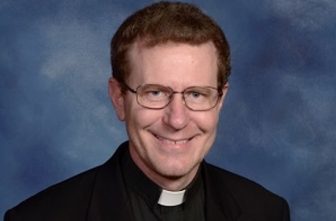The following commentary first appeared in The Michigan Catholic, newspaper of the Archdiocese of Detroit. It was written by managing editor Mike Stechschulte and is reprinted with permission.
If there’s a single theme coming from the U.S. bishops in regard to this year’s election, it’s this: Catholicism isn’t political, but politics sure can touch on Catholicism.
One of the greatest perennial challenges for the Church’s shepherds is walking the fine line between political endorsement and a faithful upholding of the Gospel in civic — and political — life. Inevitably, criticism comes from both sides of the congressional aisle when the bishops weigh in on topics addressed in party platforms and candidates’ stump speeches.
The challenge is compounded by the bishops’ steadfast refusal to endorse parties or candidates, a position that often frustrates readers of left, right and center persuasion. Why, they ask, when it seems so obvious that Candidate A opposes Church teaching on a given subject, doesn’t the Church endorse Candidate B, or vice versa?
One reason is simple: Truth doesn’t change, but people’s minds do. The Church endorses positions, not candidates, because candidates are faulty. Christian principles should be applied regardless of who espouses them, and so for good reason, the Church doesn’t tie itself to the policies of any human being except its founder, Jesus Christ.
But that doesn’t mean voting is arbitrary or detached from Christian reality, either.
While stopping short of endorsement, the U.S. bishops have made clear that while Catholics aren’t single-issue or partisan voters, living the Gospel faithfully does require taking uncompromising stands against intrinsic evils.
In layman’s terms (that’s the language we speak, anyway), an “intrinsic evil” means something that’s always and in every case wrong. It doesn’t become less wrong in any circumstance, and as such, must always be opposed by Christ and his Church. While Catholics are called upon to make prudential judgments on many issues, “intrinsic evils” are black-and-white.
Abortion issue
And sometimes, the bishops point out, that consideration reaches the political realm.
Archbishop Allen Vigneron, in an article in the Detroit Free Press, stated through his communications office that “when Catholics go into the voting booth, they should try to promote the common good — recognizing that some issues are more important than others.”
“At the same time,” the statement said, “we have the clear obligation to oppose intrinsic evils, which can never be justified, such as abortion. Catholics should not vote for a candidate who supports something intrinsically evil unless there are proportionate reasons to do so. And, in the case of abortion, it is hard to imagine what could be proportionate to the taking of over a million innocent human lives per year in the United States.”
Baltimore Archbishop William Lori issued a similar statement in August, saying that “a Catholic, regardless of his party affiliation, shouldn’t be voting for such a person (who supports an intrinsic evil).”
While abortion isn’t the only intrinsic evil to speak of, there’s a reason it’s consistently cited as an example. Abortion is no small problem, nor is it simply one among many. As Archbishop Vigneron said, it’s hard to imagine a worse evil than the deliberate killing of innocent human beings.
For “proportionate reasons” to be met to vote for someone who supports abortion, the other option must not only support a clear evil as well, but support something at least as evil as allowing the plague of millions of deliberate innocent deaths. That’s a tall order.
The bishops don’t continually cite abortion as a front for political favoritism. They cite it because abortion is emphatically, clearly and in every case wrong, and being faithful to the Gospel requires opposing it in all circumstances.
Other issues certainly warrant a Catholic’s consideration, too, and the bishops haven’t been silent on questions regarding the poor, the economy, immigration, education and even environmental issues. When neither candidate (or both in equal degree) support an intrinsic evil, the Catholic voter is called to make judgments regarding which candidate’s policies will better support a just society in many of these areas.
Being Christ-like certainly means caring for the poor and downtrodden and being good stewards of our resources, but it means first and foremost always opposing intrinsic evil. We simply cannot be like Christ if we don’t. As the Catechism of the Catholic Church states in No. 1759, “An evil action cannot be justified by reference to a good intention.”
Cause for concern
Archbishop Charles J. Chaput of Philadelphia was even more direct when speaking about his own personal views to the National Catholic Reporter. While stressing that the Church shouldn’t identify with any one political party (“I’m registered as an independent,” he said), Archbishop Chaput said that “as an individual and voter I have deep personal concerns about any party that supports changing the definition of marriage, supports abortion in all circumstances, wants to restrict the traditional understanding of religious freedom. Those kinds of issues cause me a great deal of uneasiness.”
Inevitably, there will be some who hear the bishops’ opposition to such wrongs and conclude politics is at play. But the Church has always opposed these evils — long before political lines were drawn — and the strength of its opposition hasn’t changed.
Government exists to serve a just society, but intrinsic evils can never be a means — or even collateral — toward that end.




